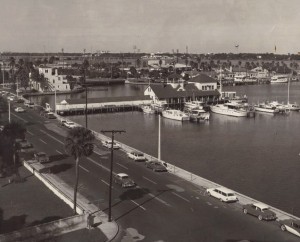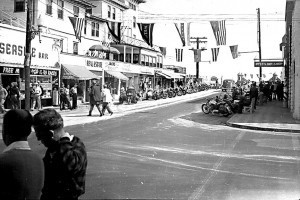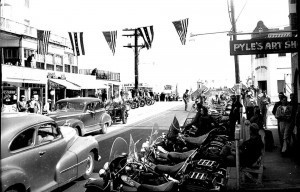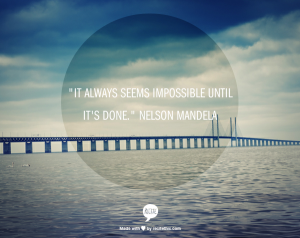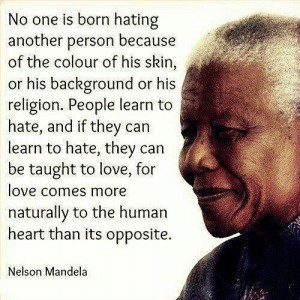Michael A. Pyle's Blog, page 178
August 21, 2013
Royalty and Servitude
I was talking last night in Athens, Greece to a taxi driver about immigration, race relations, etc. We kept saying to each other’s comments – “It’s the same in our country.” Just different races and cultures, but discrimination nonetheless. Then, this morning, I was reading Yoani Sanchez’s English site, the well-known Cuban blogger, and she had posted this interesting account that sounds just like the U.S. in days past (or present?)
http://generacionyen.wordpress.com/20...


August 12, 2013
Halifax River Yacht Club
The Halifax River Yacht Club is a prime setting of White Sugar, Brown Sugar. That’s because as a young boy, I spent so much time there. The racial issues raised in the book were evident there. Black members were not allowed; Blacks did fish with cane poles on the wall in front of it; there was only one Black employee, Brownie. The photo below shows the HRYC as I remember it, in the late 50s and early 60s, before the enclosed small boat docks were replaced with a parking lot, and before the road to the Yacht Basin had been built to the south. Imagine Roosevelt and his family fishing from the wall, straight across from the dock, as Jude fished.


August 7, 2013
Bike Week 1949 Daytona Beach
My favorite photos; I actually came across these on Facebook. It’s 1949 on Main Street, Daytona, looking east from A1A. You can see the coquina overpass that still joins the pier to the Boardwalk. The sign to the right that says “Pyle’s Art Shop” was my grandparents’ gift shop and later an antique shop. My grandmother always enjoyed all the commotion that came with Bike Week and the bikers. She kept the store until she was in her 80s.


July 20, 2013
Long Walk to Freedom: Nelson Mandela
AudioBook
Michael Pyle’s Goodreads review Jul 20, 13
5 of 5 stars
Read from July 14 to 20, 2013
Nelson Mandela’s Long Walk to Freedom audiobook is read by Danny Glover, who does a magnificent rendition. He speaks with a bit of an apparent African accent and (I think) pronounces the African words very, very well.
This is President Mandela’s explanation of what happened to him, from youth, to rebel, to prisoner, to president. It’s intriguing and well-written. I enjoyed the audio version.
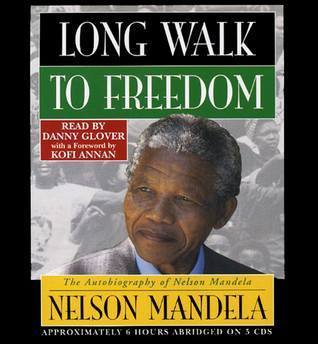


July 16, 2013
Nelson Mandela Quote of the Day – Impossible?
Now that Nelson Mandela seems to be recovering, all the more reason to pay attention to some of his well-known quotes:


July 5, 2013
Nelson Mandela Hatred vs. Love
Mandela Quote of the Day
July 4, 2013
New Versions of White Sugar, Brown Sugar Printed
The new e-book version of White Sugar, Brown Sugar has been finalized and should appear along with the new paper version in various outlets soon. The prior books showing pen name E.G. Tripp as author are being replaced with the new version, showing Michael A. Pyle as author.


Nelson Mandela’s Contributions To Worldwide Equality
As Nelson Mandela seems to be nearing the end of his life, it is important to recognize how his tremendous achievements are a guidepost for all humanity.
Mandela, a former president, opponent of apartheid, and and an activist for human rights, He led peaceful protests and armed resistance against injustice, and was imprisoned for many, many years as a result.
Apartheid (Afrikaans pronunciation: [ɐˈpɑːrtɦɛit]; from Afrikaans “the state of being apart”) was racial segregation created by a series of law enacted by South Africa’s National Party (NP) government, the ruling party of South Africa from the late 1940s to the mid 1990s. Under apartheid, white supremacy and Afrikaner minority rule was maintained, while the rights of black South African citizens were crushed. The legislation classified inhabitants into four racial groups (“native”, “white”, “coloured”, and “Asian”), and designated residential areas in which certain racial groups could reside. In 1970, political representation by non-whites was abolished. Black people lost their citizenship, and were reassigned as citizens of tribally based self-governing homelands called Bantustans. The government segregated education, medical care, beaches, and other public services, and provided black people with services inferior to those of white people.”
Mandela was imprisoned for nearly three decades as the result of his work for the antiapartheid movement. After his release in 1990, he participated in the eradication of apartheid and in 1994 became the first black president of South Africa, forming a multiethnic government to oversee the country’s transition. He retired from politics in 1999, but remains devoted to peace and social justice.
Nelson Mandela was born in 1918 into a royal family of the Xhosa-speaking Thembu tribe in a village in South African, in which his father served as chief. After the death of his father, when he was nine, his adoptive father prepared him for tribal leadership.
Mandela completed his primary studies at a local missionary school, and was the first in his family to receive a formal education. After obtaining his university degree, Mandela studied law and became involved in the movement against racial discrimination. He developed strong relationships with black and white activists.
After the 1948 election of the Afrikaner-dominated National Party in South Africa, resulting in the law of apartheid, the ANC adopted a plan to achieve full citizenship for all South Africans through boycotts, strikes, civil disobedience and other nonviolent methods. Mandela helped lead the ANC’s 1952 Campaign for the Defiance of Unjust Laws, traveling across the country to organize protests against discriminatory policies. He also promoted the manifesto known as the Freedom Charter, which was ratified by the Congress of the People in 1955. Also in 1952, Mandela and a compatriot opened South Africa’s first black law firm, which offered free or low-cost legal counsel to those affected by apartheid legislation.
After being arrested, tried and acquitted, and seeing violent reaction to passive resistance, Mandela decided it was time for more radical approach to activism.
In 1961, Mandela co-founded and became the first leader of Umkhonto we Sizwe (“Spear of the Nation”), a new armed wing of the ANC. He later said “I]t would be wrong and unrealistic for African leaders to continue preaching peace and nonviolence at a time when the government met our peaceful demands with force. It was only when all else had failed, when all channels of peaceful protest had been barred to us, that the decision was made to embark on violent forms of political struggle.”
The Spear of the Nation launched a sabotage campaign against the South African Republic. Mandela traveled abroad illegally and after returning, was arrested and sentenced to five years in prison. Later, while still in prison, he was implicated in other guerrilla activist activities, and tried for sabotage, treason and violent conspiracy. During the trial, Mandela admitted to some of the charges against him, while defending the ANC’s actions. In a speech during the trial in which he denounced the injustices of apartheid. He ended with the following words: “I have cherished the ideal of a democratic and free society in which all persons live together in harmony and with equal opportunities. It is an ideal which I hope to live for and to achieve. But if needs be, it is an ideal for which I am prepared to die.”’
Nelson Mandela spent the first 18 of his 27 years of imprisonment in the brutal Robben Island Prison, a former leper colony off the coast of Cape Town, where he was confined to a small cell with no bed or plumbing and compelled to perform hard labor in a lime quarry. As a black political prisoner, he was served smaller food rations and had fewer privileges than other inmates. He was permitted to visit with his wife, Winnie only once every six months. Mandela and his fellow prisoners were routinely subjected to inhumane punishment.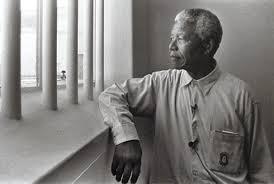
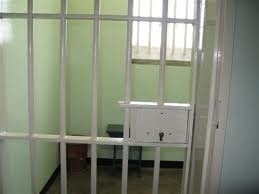
Despite the poor conditions and poor treatment, Mandela earned a bachelor of law degree from the University of London and served as a mentor to his fellow prisoners, encouraging them to seek better treatment through nonviolent resistance. He also surreptitiously sent out of the prison political statements and a draft of his autobiography, “Long Walk to Freedom,” which was published five years after his release.
During his lengthy imprisonment, Mandela remained the symbolic leader of the antiapartheid movement. Due to pressure on the government for his release, the government offered to release him, if he would accept various conditions, including the renouncement of violence, but he rejected all the offers for freedom.
Mandela was released from prison in 1990, after which he led the ANC in its efforts to eliminate apartheid and create a multiracial government.He earned the Nobel Peace Prize in 1993. Largely due to his efforts, 22 millionSouth Africans were able to votein the firstmultiracial parliamentary election in 1994. The ANC was elected by a huge majority, and Mandela was elected by an overwhelming majority as the first black president of South Africa.
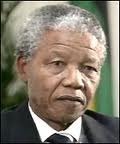 As president, Mandela established the Truth and Reconciliation Commission to investigate human rights and political violations committed by both supporters and opponents of apartheid between from1960 to the mid-1990s. He spearheaded many social and economic reforms to improve the living standards of South Africa’s black population. In 1996 a new South African constitution was enacted, which established a strong central government based on majority rule and prohibited discrimination against all minorities, including whites.
As president, Mandela established the Truth and Reconciliation Commission to investigate human rights and political violations committed by both supporters and opponents of apartheid between from1960 to the mid-1990s. He spearheaded many social and economic reforms to improve the living standards of South Africa’s black population. In 1996 a new South African constitution was enacted, which established a strong central government based on majority rule and prohibited discrimination against all minorities, including whites.
Mandela’s goals including Improving race relations, discouraging Blacks from retaliating against the white minority, and promoting the vision of a united South Africa. He formed a multiracial “Government of National Unity” and proclaimed the country a “rainbow nation at peace with itself and the world.”
His inaugural speech appears here, and has a number of important Mandela quotes:
http://www.africa.upenn.edu/Articles_Gen/Inaugural_Speech_17984.html
Inaugural Speech, Pretoria [Mandela]- 5/10/94
He has continued to devote his life to peace and social justice throughout the world, and has created and been instrumental in a number of organizations.


Nelson Mandela’s Rainbow Nation At Peace
In Nelson Mandela’s Inaugural Speech in 1994, he spoke of a “rainbow nation:”
“We have triumphed in the effort to implant hope in the breasts of the millions of our people. We enter into a covenant that we shall build the society in which all South Africans, both black and white, will be able to walk tall, without any fear in their hearts, assured of their inalienable right to human dignity – a rainbow nation at peace with itself and the world.”



